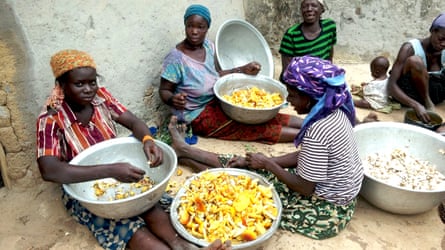At the forest’s edge, a scientist is giving a lesson on the mushrooms that grow here in the damp ground around the trees of Toui-Kilibo reserve in Benin. Olyvia Fadeyi is a mycologist – she studies fungi – and is teaching the women from the village of Yaoui how best to harness the economic value of this strangest of crops. Mushrooms can be cultivated year round, in back gardens, on vertically stacked shelves, rather than waiting for the naturally abundant ones in the rainy season.

“There are 40 species, of which only 2% are currently harvested,” says Fadeyi. “I want to empower these women and help them break free from the pressures of society.”
The mushroom could be important if it can bring in money to rural communities where the pressures are many: from climate crisis and gender inequalities to the potential spread of the jihadist attacks in the far north. Since late 2021 there have been 28 attacks in Benin by extremist Islamist groups involved in the conflict across the borders with Burkina Faso and Niger. Most have occurred in Pendjari national park, known for its lions and hippos but now patrolled by Benin’s military and a no-go area for civilians.
The spread of conflict in the Sahel region depends on the recruitment of disaffected men who have few economic options. Women having livelihoods and income is an important alternative for husbands or male family members who might be otherwise be drawn to groups such as the al-Qaida-affiliated Jamaat Nusrat al-Islam wal Muslimeen.
Benin is a country developing in real-time. President Patrice Talon is using investment from raised taxes and international development organisations to build roads, put in place street lighting and create a cultural tourism project with new museums and galleries celebrating Benin’s history.
But opportunities for women in areas away from the urban hubs are few. Just 13% of women in Benin own land and 30% marry before the age of 18, according to a UN report. Fadeyi is offering an intriguing alternative. Grown indoors, in high concentration, mushrooms can mitigate a little of the damage done by slash-and-burn deforestation, which farmers carry out to clear plantations for crops such as cashews.
“Women are expected to work and earn money,” says Fadeyi. “But what they earn from farming is not enough, and the money they do earn they are expected to give to their husbands.”

Albertine Doussoumon and her mother, Rosaline Chabi, are two of 180 women from three villages taking part in Fadeyi’s pilot project, overseen by the University of Parakou.
“We women make money from gathering firewood and collecting sand for the construction companies,” says Doussoumon, in Nago, a dialect similar to the Yoruba spoken on the Nigerian side of the forest. “We use that to buy clothes for the children.”
Doussoumon’s daily routine is working the plot of land owned by her husband where they grow maize, cassava, yams and rice. In the rainy season she picks mushrooms to eat with pounded yam and sell at the market.
“It rained a lot in the past, but not so much now,” she says. “And the intensity of the harmattan has reduced.”
The harmattan is the dry wind that blows from the Sahara across the Sahel, cooling coastal west Africa in the winter. The climate crisis has increased desertification and temperatures are rising 1.5 times faster than the global average.
On the road to Yaoui’s nearest city, Parakou, where the university academics monitor mushroom plots, trucks carry loads of cotton south to the port of Cotonou. Most of Benin’s cotton gets exported, but recently textile manufacturing has started in newly built industrial parks.
Talon made his money in cotton and he has plans for the economy. While taking a hard line on political dissent, he has also made efforts to tackle corruption by doubling the salaries of politicians and civil servants. He hopes to encourage the kind of technocracy lacking in Benin’s ruling classes, but which has facilitated progress in countries such as Nigeria and Ivory Coast.
after newsletter promotion
Benin – a Marxist state from 1975 until 1990 – is still remote from global capitalism: no multinationals operate here and there is an informal economy. Petrol, for example, which is extracted across west Africa by corporations such as Shell and Total, is mostly bought and sold in glass bottles at roadsides, and illegally shipped in from Nigeria.
Agriculture is a big part of Benin’s development plan – and makes up 30% of GDP – but cotton and cashews have few sustainable benefits for the largely female workforce. There is space for a mushroom industry and women’s development could be pivotal in the fight against jihadism.

While military reinforcement is critical – Talon is negotiating weapons and personnel deals with Rwanda, Turkey and China – it is at community level that militancy must be tackled. In border villages, the recruitment strategy of the jihadist groups relies on economic coercion, not religious radicalisation.
“The extremist gangs come and give bags of rice or farming tools to struggling families,” says a former official, who asked not to be named.
“Later, they come back and give them a gun and say, ‘Remember that rice we gave you, now we need you to do this for us.’”
“We are aware of the situation in Burkina, and we pray it does not come to our doorstep,” says Doussoumon.
Fadeyi, who recently received €10,000 to fund her mushroom-growing initiative from a science-funding foundation and is asking for additional support from the Beninese authorities, is focused more on empowering rural women than tackling the security issues.
“Business mentoring will help them assert themselves in a commercial, entrepreneurial way,” she says. “Next, we will check the quality of fresh mushroom production and give refresher courses.
After that the women will be left to their own devices, as they will have the necessary skills and will no longer need us. They will be completely autonomous.”
